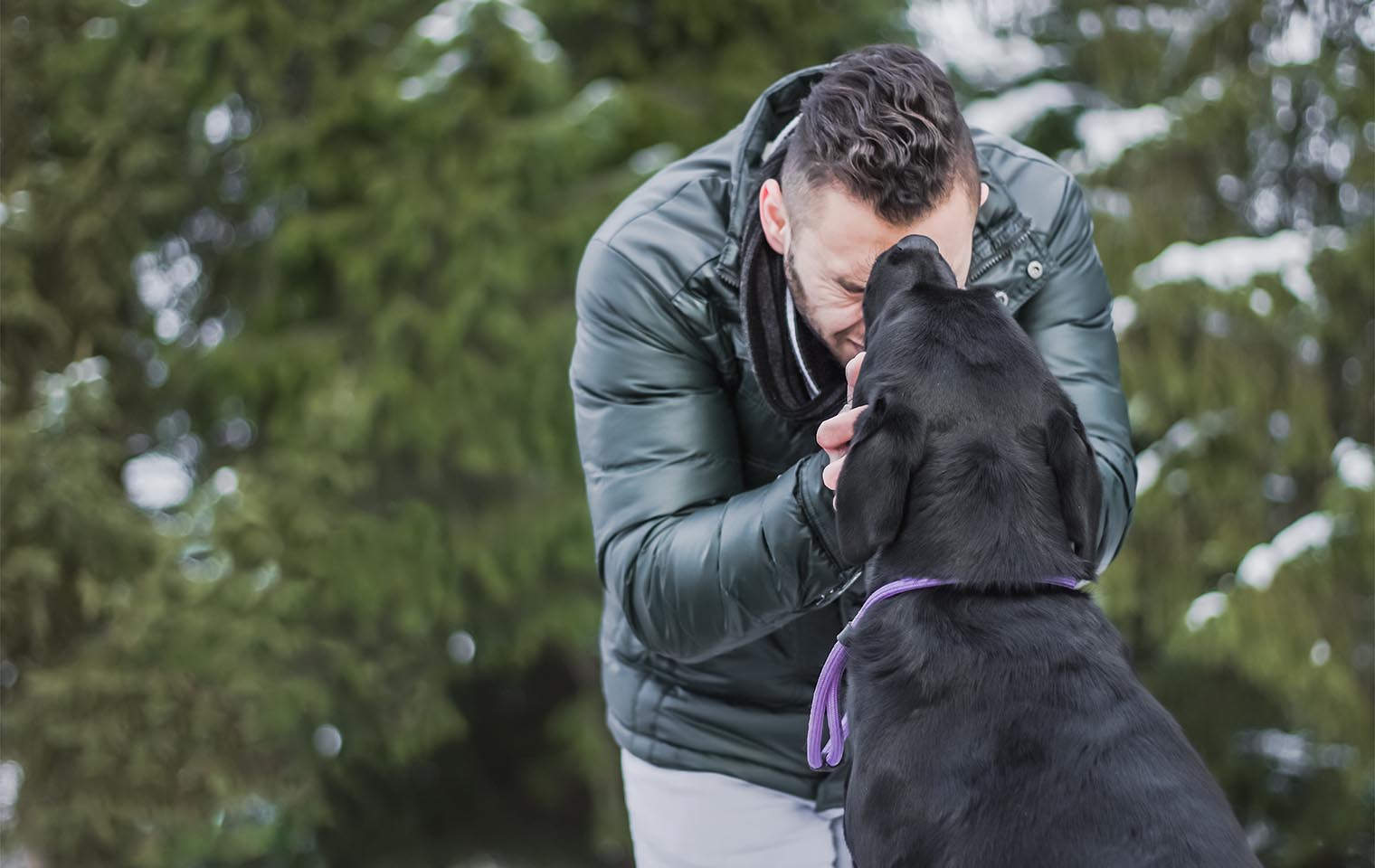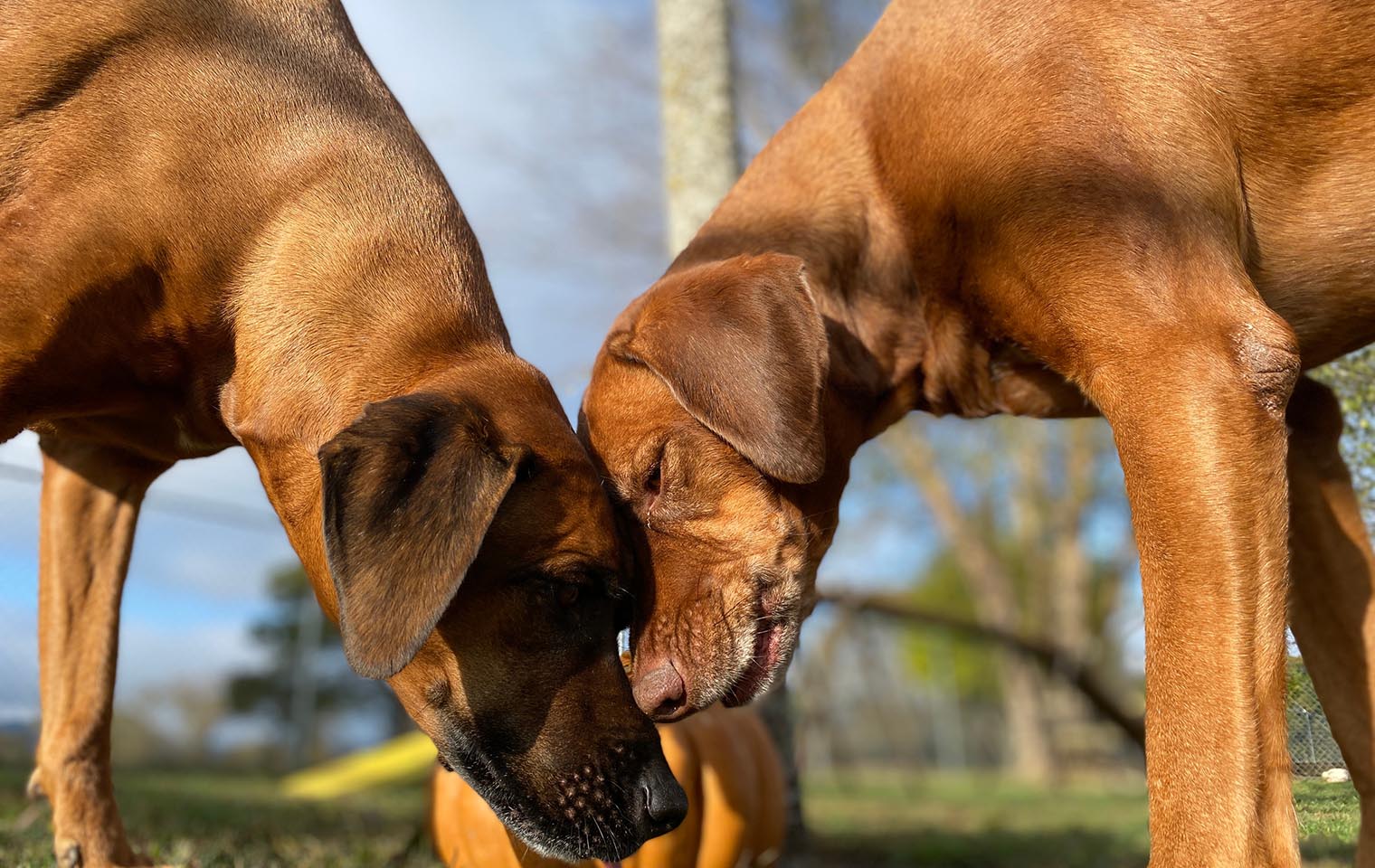Affection or infection?
It may seem like a harmless and even cute display of affection, but allowing your pet to ‘kiss’ you could be detrimental to your health.
There are few things more uplifting than getting plenty of excited affection from your pooch when you arrive home or when you meet a friend’s puppy for the first time. The waggy tail, wiggly body, big smiles and sweet little licks and kisses can be the best happiness boost on the planet. The problem with the latter is that dogs spend a lot of their time with their mouths and noses in very unsavoury places. Because of this, their mouths are full of all sorts of bacteria, viruses and germs. When a dog licks your face, these unwelcome bugs can enter your body through mucus membranes via your nose, mouth or eyes, or through the skin if there’s even a tiny scratch or wound.
While it’s true that your dog’s mouth contains plenty of bacteria that are completely harmless to humans, it can also carry a number of pathogens that are “zoonotic”, meaning they can spread from animals to humans and cause disease. These include both bacteria and parasites, like Salmonella, Pasteurella, Campylobacter, Cryptosporidium, Clostridium, E.coli, Leptospira, Giardia, ringworm and hookworm. There are also cases of dogs spreading Haemophilus aphrophilus to humans, causing brain abscesses, inflammation of the heart and severe tapeworm infection (Dipylidium caninum).
It’s very important to wash your hands properly after cleaning up after your dog, since it’s possible to contract infections from their infected faeces - and there is no way to know if it’s infected.
Between 2001 and 2011, tests in France revealed that Pasteurella multocida, a dog’s normal mouth bacterium, was to blame for meningitis in 42 infants who had been “kissed” by the family dog. While these statistics may not be that alarming in terms of numbers, the fact is it can happen and the only way to prevent it is to avoid a dog’s tongue near your or your child’s face.

Earlier this year, a 70-year-old woman nearly died from septicaemia from the Capnocytophaga canimorsus bacteria. Her dog was tested for the bacteria, and it was confirmed that it was spread from dog to owner through “harmless” affection. Just this month, an outbreak of Campylobacter infections in sick puppies in the US spread to 67 people, with 17 of them hospitalised. These outbreaks are a common occurrence in America, with at least a few bouts in various US states every year. The scariest part is that people can also pick up the bacteria and have the infection without any symptoms at all, and then pass it on unknowingly to the people around them.
When your dog has diarrhoea, you should take extra precautions, since he or she will be shedding millions of microorganisms in their faeces. If possible, try to isolate your pup to one room or area, don’t let them on your bed, wear gloves when you clean up after them, and make 100% sure you wash your hands after touching them.
Another big problem rearing its head is the spread of an antibiotic-resistant strain of E.coli bacteria, which scientists fear are being carried (and passed on) by household pets. Experts from the UK Royal Veterinary College and the University of Lisbon tested the faeces of humans and pets in 41 Portuguese and 45 British homes. The project included 114 humans, 85 dogs and 18 cats. Samples were collected from all the subjects and genetically tested for superbugs. 14 dogs, one cat and 15 humans tested positive for strains of drug-resistant E.coli, known to be resistant to multiple antibiotics, including penicillin and cephalosporins. In many cases, the people and pets from the same household were found to have bacteria with matching antibiotic-resistant genes, implying that that one had contaminated the other. The contamination was almost certainly from pet to human, through the human coming into contact with the pet’s saliva.
Where do dogs pick up harmful, zoonotic pathogens? The problem is they can pick them up from just about anywhere - from licking themselves or sniffing other dogs (and their mess); from contaminated food or water; from contaminated streams or rivers; from dead animals, bones and even the soil in your garden. While some of these bacteria or viruses can make your dog sick (usually with diarrhoea or vomiting), others may infect him or her but cause absolutely no symptoms in the dog, so you wouldn’t even know that your sweet pup’s kisses caused your tummy bug.
As cute as doggy kisses are, humans are not meant to come into contact with some of the bacteria contained in dog saliva and it’s best not to let your dogs lick faces. You don’t need to stop letting your dog lick you completely, but keep your face and any open wounds off-limits. And if you do get a few kisses, make sure you wash your face properly afterwards. You should also wash your hands after a dog has licked them – eating or touching your face when you’ve come into contact with dog saliva or pathogens that may be on the dog’s paws or coat is another way that pathogens can enter your body.
The best thing about dogs is that they don’t judge or take things personally, so you don’t have to worry about hurting their feelings if you get into a habit of washing your hands and face after those cute cuddles!

Good to know:
- It’s very important to wash your hands properly after cleaning up after your dog, since it’s possible to contract infections from their infected faeces - and there is no way to know if it’s infected.
- When your dog has diarrhoea, you should take extra precautions, since he or she will be shedding millions of microorganisms in their faeces. If possible, try to isolate your pup to one room or area, don’t let them on your bed, wear gloves when you clean up after them, and make 100% sure you wash your hands after touching them.
- How often should you deworm your dog?
Vets recommend giving your dog a deworming tablet, such as Marltons WormPro every three months. Of course, if there are signs that your dog is infected, you should administer a deworming tablet as soon as possible. Many worms look like spaghetti or rice. If you see worms or pieces of worms in the stool or on your dog’s fur near the tail, or if your dog drags it’s bottom along the carpet, there’s a strong likelihood it has worms. Speak to your vet if it seems to be recurring very often.
Marltons WormPro is an effective deworming tablet for dogs and can be used as a remedy for Ascarids, hookworms, whipworms and tapeworms. They are easy to administer - if your dog doesn’t readily eat it, simply cover with some meat and give it as a treat. The tablets are available for small, medium and large dogs and it’s important you give the right tablet according to the dog’s weight.
- As with COVID and many other infections, those most susceptible to getting really sick from bacteria, viruses or germs picked up from the family pet are immunocompromised people, pregnant women, people with HIV/AIDs, people receiving chemotherapy, transplant patients, young children and the elderly.
TWO COMMON MYTHS
1. “A dog’s mouth is cleaner than a human’s mouth.”
There is a common myth that a dog’s mouth is cleaner than that of a human. This is simply not true – we have different bacterium and germs present all the time; the difference is that humans practise good oral hygiene, while dogs don’t. More than that, dogs lick all the parts of their body, eat the faeces of birds and other animals, and might also eat decaying flesh and other unsavoury things we wouldn’t dream of putting in our mouths.
2. “It’s healthy to be exposed to different bacteria, as it builds up your immunity.”
Yes, dogs will expose people to new and different types of bacteria, but there’s no evidence that this builds your immunity to any diseases. Humans can’t gain immunity from some of the pathogens that dogs carry, for instance parasites, so rather than building your resistance, they will just repeatedly infect you.



